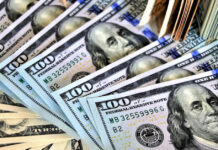The government doesn’t want you to know it, but we’re in a recession. Technically, a recession is two consecutive quarters of sinking GDP, and we’re in the second quarter. In the first quarter, GDP fell 1.4 percent, yet the media was not ready to call this the start of a recession. Instead, they acted like apologists. Here’s a quote that ran on CNBC:
“This is noise; not signal. The economy is not falling into recession,” wrote Ian Shepherdson, chief economist at Pantheon Macroeconomics. “Net trade has been hammered by a surge in imports, especially of consumer goods, as wholesalers and retailers have sought to rebuild inventory. This cannot persist much longer, and imports in due course will drop outright, and net trade will boost GDP growth in Q2 and/or Q3.”
Have you ever heard of Pantheon Macroeconomic before? I have not. My guess is the media sifted through reports until they found the least negative comment possible. Why? Because they don’t want to scare anyone. They needn’t have bothered, the stock market just did, with the Dow dropping more than 900 points on Friday. Netflix and Amazon are hardly the only companies that suffered as consumers cut back on spending. If consumers are not scared, they should at least be nervous.
Anyone that drives by a gas pump and hopes to make it to payday before they need to fill up, or stands in the grocery store trying to decide if they can afford meat, knows that all is not well with the economy.
What Happens During a Recession?
Here are a few things that happen during a recession:
- Businesses see lower sales, resulting in a decline in income and profitability. This leads to layoffs. If you are in sales, expect your commission to drop.
- Struggling companies and those in vulnerable industries close and declare bankruptcy.
- Unemployment rises as people lose their jobs. It becomes more difficult to get a job because companies implement hiring freezes or decide not to replace workers who leave.
- The stock market sinks and people feel less wealthy. Retirees and other people living on their savings spend less.
- People in service industries lose business as people put off work or do it themselves. For example, women decide to do their nails themselves and men have their wives to cut their hair instead of paying a barber. (I’m not trying to sound sexist, this happens.) People will mow their own lawn, walk their own dog, and paint their own house.
- Consumers go on vacation less. This translates into fewer hotel stays, less business at vacation spots, fewer kennel nights, and other income losses in the tourism industry. That means everyone from the miniature golf place to the hotel bar needs fewer employees.
- People also make fewer large purchases. For example, they will hold off on buying furniture, keep their car longer than they might otherwise do, and delay making home improvements.
- New home building stops, which affects contractors and suppliers to the building industry.
- Taxes decline and municipalities cut back on services to save money. There may be fewer police officers, less frequent trash pickup, slower ambulance response times, longer lines at city and county offices, etc.
Surviving a Recession
It’s been said that it’s a recession when your neighbor loses his job, but a depression is when you lose yours. There’s a great deal of truth in that statement. The key to surviving a recession is to keep your job and/or have a steady source of income. Another way to weather a recession is not to have large, recurring debt payments, like a car payment or high credit card balances.
Job loss can lead to a cascading effect ending in the collapse of your personal economy. If you lose your job, debts will just suck you under. Without a job or other source of income, you cannot pay your bills, collectors will call you, you could lose your house, and you may lose your car. It drains any savings you may have leaves you far worse off, even after a recovery.
This is where a two-income family may have an advantage. Even if you are used to living on two incomes, you may be able to survive on one plus unemployment. Just give up any expensive habits and cut back on non-critical spending.
There is almost always work available, but people turn it down because it doesn’t pay what they are used to making or they consider it beneath them. As if you can afford pride during a recession. When the sheriff comes to evict you from your home, you may wish you took that job mopping floors or working at the convenience store.
Look out for Stagflation
Recession often leads to deflation, but we are headed towards stagflation, which is defined as a combination of a recession and inflation. That’s no fun for anyone.
Even the family with two incomes will have a hard time during stagflation because prices are rising. You’ll have to run to keep up, yet still seem to fall behind with every step. For example, in 2022, the average employee raise has been of 3.4 percent, but inflation is at least 8.5 percent. That means their average spending power dropped by more than 5 percent. That’s what you have to look forward to: costs that rise faster than your income during a period of job loss and economic weakness.
Add a war, food shortages, and supply chain disruption into the mix, and you can expect things to get worse. Think higher crime, for example, with an increase in home invasions and robberies.
What you can Do
Your normal preps will help you weather the storm. For example, if they lay you off, you can eat your storage food and avoid going to the store and spending money. But there are other things you can do:
- Pay down your debts and do not add new ones
- Avoid doing anything at work that would put you on the short list of people who they would let go first. Instead, make yourself as valuable to your employer as possible.
- Save some money to help tide you over if you lose your job or if prices rise more than expected
- Look for a side gig or part time opportunity.
- Brush up on skills that can help you earn money.
Stock up and stay cautious friends. There’s eight months left in 2022 and I doubt they’ll be any better than the first four.








